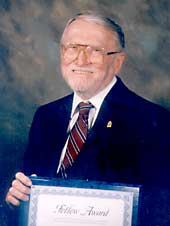 C.P. Dillon (1921-2004)
C.P. Dillon (1921-2004)

Paul Dillon was one of the most vocal corrosion specialist we have had on this planet. His level of activity was only surpassed by his excellent judgment in all matters of materials vs. corrosive environments. He was also an exception in the community of corrosion engineers for his perception of the usefulness of personal computers and corrosion related software. He was appointed Corrosion Doctor Emeritus in 1999 for his immediate endorsement of the Web when it was launched.
C.P. ("Paul") Dillon was a registered professional engineer in the State of California (Corrosion Engineering), a NACE-certified Corrosion Specialist and a Fellow of NACE International and the Materials Technology Institute of the Chemical Process Industries.
A graduate chemist (Georgetown U.) and meteorologist (Army Air Corps TTC), he took advantage of an improved pension plan to retire as Manager, Materials Engineering, from the Chemicals & Plastics Division of Union Carbide Corporation after 34 years of service. (photo courtesy)
A consultant since 1976, he is a recognized authority on materials selection, heavy chemicals manufacture, inorganic preparations, selected organic syntheses and specific problems associated with the chemical process industries. He has served as a consultant for UNIDO in Romania, Turkey and India. Since 1986, he has been the Chemical Process Industry consultant for the Nickel Development Institute.
Read also Paul Dillon on Corrosion Costs, Corrosion Data, or Lamellar Corrosion
He was the author of "Corrosion Control in the Chemical Process Industries-2d Ed." (NACE 1993); "Materials Selection for the Chemical Process Industries (McGraw-Hill 1992); "Corrosion Resistance of Stainless Steels" (Marcel Dekker 1995); MTI Manual No. 1, "Guidelines for Prevention of Stress Corrosion Cracking of Nickel-Bearing Stainless Steels and Nickel-Base Alloys"; the MTI Special Technical Paper, "Pyrophoric Surfaces on Zirconium Equipment- A Potential Ignition Hazard"; MTI Manual, "Guidelines for Performance of Seawater-Cooled Tubular Heat Exchangers in the Chemical Process Industries" (NiDI No. 12 002) and co-author (with D.R. McIntyre) of MTI Manual No. 15, "Prevention of Stress Corrosion Cracking in the Chemical Process Industries" and the MTI publication, "Pyrophoric Behavior of the Reactive Metals", as well as numerous technical articles. He was editor of and contributor to the NACE Handbook No. 1, "Forms of Corrosion- Recognition and Prevention".
He was also the Domain Expert for the MTI/NACE/NiDI Materials Selection Advisors on Concentrated Sulfuric Acid/Oleum, ChemCor.1 (September 1989), Dilute Sulfuric Acid and Once-Through Waters. He has also served on the Resource Groups for other MSA's in this series of computer-assisted materials selection systems and is Technical Editor of the accompanying monographs, e.g. MTI Publication MS-1, "Materials Selector for Hazardous Chemicals- Vol. 1: Concentrated Sulfuric Acid and Oleum"(1997 ), MS-2, "Vol.2; Formic, Acetic & Other Organic Acids"(1997) and MS-3, "Hydrochloric Acid, Hydrogen Chloride and Chlorine"(1999). He is technical editor of the 2001 CorSur Windows 98 revision.